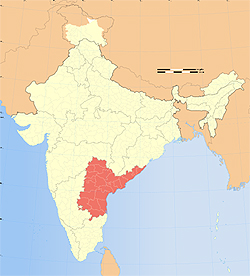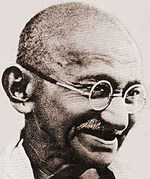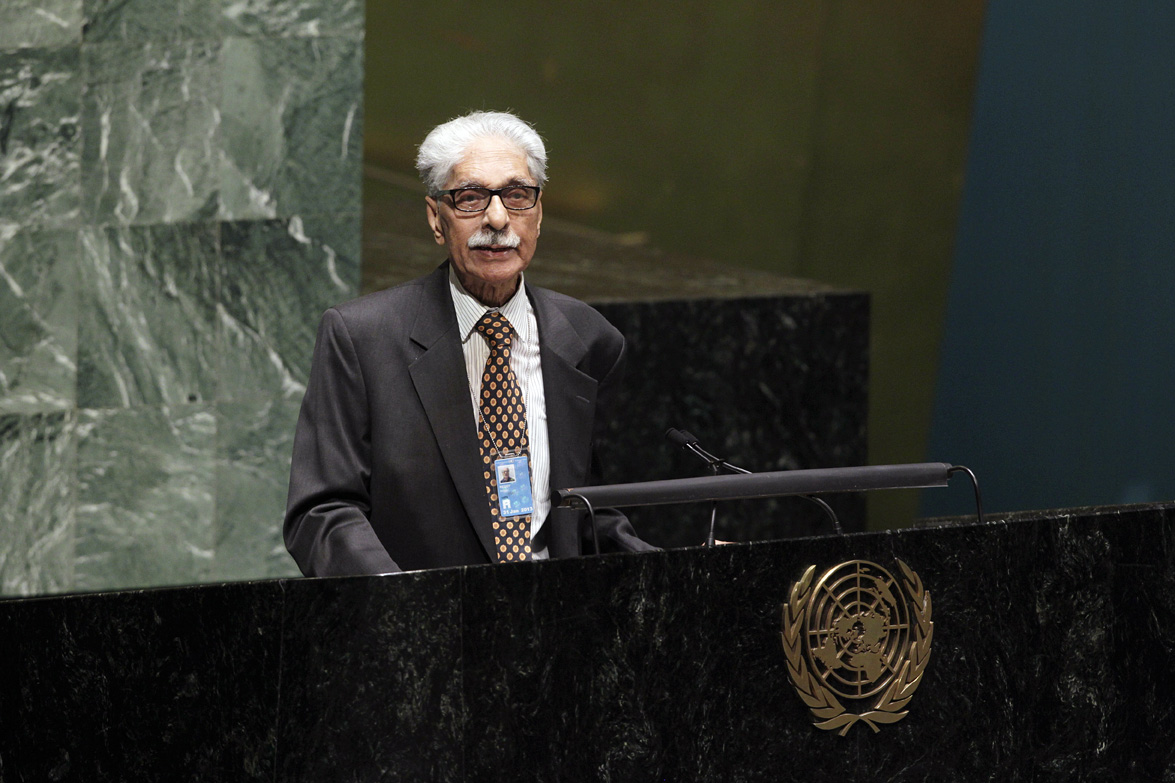Enuga Sreenivasulu Reddy affectionately known as ES Reddy has been active in support of the South African freedom movement for more than half a century. He played a central role in promoting international sanctions against South Africa and assistance to struggle for freedom. Mr E.S. Reddy was born in 1924 to a politically active family in Andhra Pradesh, South India.
 Map showing Andhra Pradesh in Southeast India. Source: http://en.wikipedia.org/
Map showing Andhra Pradesh in Southeast India. Source: http://en.wikipedia.org/
His father, Mr E.V. Narasa Reddy, was a follower of Gandhi and president of the Congress in the small town of Gudur. He was imprisoned for three months during the individual satyagraha in 1941. Reddy recalls that his mother gave all her jewellery to Gandhi when he visited Gudar in 1933 during a tour to collect funds for the upliftment of Harijans (untouchables). He learnt much about Gandhi from his family and from his Hindi teacher in school.
Whilst in college his political consciousness was shaped by Jawaharlal Nehru, socialism and Marxism like many of the young people at that time. In late 1943 his interest in South Africa was sparked by pamphlets from South Africa that his cousin gave to him. One of the pamphlets was written by Dr. Yusuf M. Dadoo about Indians, another by Peter Abrahams about mine workers going to Johannesburg. At the same time, Indian newspapers reported about the movement by Africans and Indians against racial discrimination. In a 2004 interview with Lisa Brock, Mr Reddy explains his interest in South Africa:
'I was already interested in the anti-apartheid movement in the 1940s, when the struggle in South Africa took on new forms and Indians and Africans were cooperating in the struggle. During the Second World War, the United States and Britain talked about four freedoms in the Atlantic Charter, but those freedoms didn't apply to India or South Africa. As Indians we were very much interested in South Africa, because a lot of Indians were there and they were treated as second-class citizens or worse. And of course Nehru was talking about South Africa, Gandhi was talking about South Africa and so on.'
 Mahatma Gandhi
Mahatma Gandhi
After his arrival in the United States in March 1946 he initially struggled to get news about South Africa. Kumar Goshal, an Indian revolutionary who came into exile in America in the 1920s, was a member of the Board of the Council on African Affairs led by Paul Robeson informed him about the Council’s reading room and so his journey with the Council on African Affairs commenced.
Reddy points out that the Council on African Affairs was one of the first solidarity movements for freedom struggles in Africa. He grew close to the Council and its leaders – Paul Robeson, Dr. W. E. B. Du Bois, and Dr. Alpheus Hunton (the educational director and later the Executive Director). He was present at the huge mass meeting organised by the Council at the Madison Square Garden on June 6, 1946, to denounce racial discrimination in South Africa and call on the United States government to support African freedom. He recalls that at a reception by the Council on 8 November 1946, he met the delegation led by Dr. A. B. Xuma, President-General of African National Congress (ANC). The delegation had arrived in New York to lobby at the United Nations General Assembly which was to consider the Indian government complaints concerning the treatment of Indians in South Africa, and to advise the Indian delegation. The delegation included H. A. Naidoo and Sorabjee Rustomjee of the Indian Congresses and Senator H. Basner, a Senator representing African voters. He attended meetings organised by the Council for the delegation – e.g. a briefing for a number of trade unions and other organisations, and a public meeting at the Abyssinian Baptist Church in Harlem on 17 November. Mr Reddy led a few Indian students to a demonstration organized by the Council in front of the South African Consulate in 1946.
In 1948, E.S. Reddy did an internship at the United Nations and shortly thereafter applied for a job. In May 1949 he obtained a position as a researcher in the Section for Middle East and Africa (in the Department of Political and Security Council Affairs). He worked at the United Nations for 35 years. From 1963 to 1984 he was the U.N. official in charge of action against apartheid, first as principal secretary of the Special Committee Against Apartheid and then as director of the Centre against Apartheid. United Nations action both legitimated and was influenced by the momentum of popular mobilization against apartheid. Reddy was probably the most consistent and influential of the U.N. officials working behind the scenes, ensuring that the United Nations not only represented governments but also helped build bridges between liberation movements and their supporters around the world. He was Assistant Secretary-General of the United Nations from 1983 to 1985.
He convened and participated in a number of international conferences and seminars against apartheid, supported campaigns for action against the apartheid government and administered funds for scholarships and for assistance to political prisoners and their families in Southern Africa. The contribution of Mr. Reddy to the international campaign against apartheid has been recognised by activists of the South African liberation movement around the world. For example, Oliver Tambo, President of the ANC from 1967 to 1991, expressed "very deep appreciation of your work and your infectious devotion and commitment to the liberation struggle in South Africa." Similarly, Nobel Peace Prize and former United Nations Commissioner for Namibia, Sean MacBride said at a public meeting addressed by Mr. Reddy in Dublin on March 19, 1985:
"It has been my privilege to work with E.S. Reddy for close on 20 years, and I can say without fear of contradiction that there is no one at the United Nations who has done more to expose the injustices of apartheid and the illegality of the South African regime than he has. E.S. Reddy has done so with tremendous courage and ability; he dedicated his entire energy and skills to the liberation from oppression of the people of Southern Africa. He had to face many obstacles and antagonisms, coming from the Western Powers mainly, but he had the skill, courage and determination necessary to overcome the systematic overt and covert opposition to the liberation of the people of Southern Africa."
 Dr. Enuga Reddy, former Principal Secretary of the UN Special Committee against Apartheid.
Dr. Enuga Reddy, former Principal Secretary of the UN Special Committee against Apartheid.
E.S Reddy received the Joliot-Curie Medal of the World Peace Council in 1982 for his contribution to the struggle against apartheid. After his retirement from the UN in 1985, he was a senior fellow of the United Nations Institute for Training and Research (1985-1993) and a member of the Council of Trustees of the International Defence and Aid Fund for Southern Africa (1986-1992). The University of Durban-Westville awarded him the honorary degree of Doctor of Philosophy in 1995 in recognition of his contribution to the struggle against apartheid and scholarly work on South Africa. He has written extensively on the history of the South African liberation movement and its leaders, United Nations action against apartheid, anti-apartheid movements and campaigns, and relations between India and South Africa.
His papers and parts of his private collection have been donated to the Yale University Library in the United States, the Nehru Memorial Museum in New Delhi, and the Universities of Witwatersrand and Durban-Westville in South Africa, and several other institutions including South African History Online (SAHO). They are valuable resources to understand the struggle for liberation in South Africa and its international repercussions. Reddy has acted as a consultant to the African National Congress (ANC) Department of Information in developing the sites on Historical Documents and United Nations action.
Reddy received the Companions of O. R. Tambo in Silver, a national award from the South African Government in 2012. His citation reads:
His active support of the South African freedom movement for more than half a century. As head of the United Nations (UN) Centre Against Apartheid for over two decades, he played a key role in promoting international sanctions against South Africa and organising the world campaign to free Nelson Mandela and other political prisoners.
Enuga Sreenivasulu Reddy passed away in the United States of America on 1 November 2020.
- Enuga Screenivasulu Reddy (India), The Presidency, Republic of South Africa
- E. S. Reddy Interview, No Easy Victories, Edited by William Minter, Gail Hovey, and Charles Cobb Jr.
- The Struggle against Apartheid: Lessons for Today's World, by Enuga S.Reddy, United Nations Chronicle
- Books by ES Reddy, 5 August 2012, by Muthal Naidoo
- Enuga S. Reddy, Aluka
- Struggles for Freedom: Southern Africa, Enuga S. Reddy
- Papers of Enuga S. Reddy, Historical Papers Research Archive - Wits
- E. S. Reddy papers, Archives at Yale